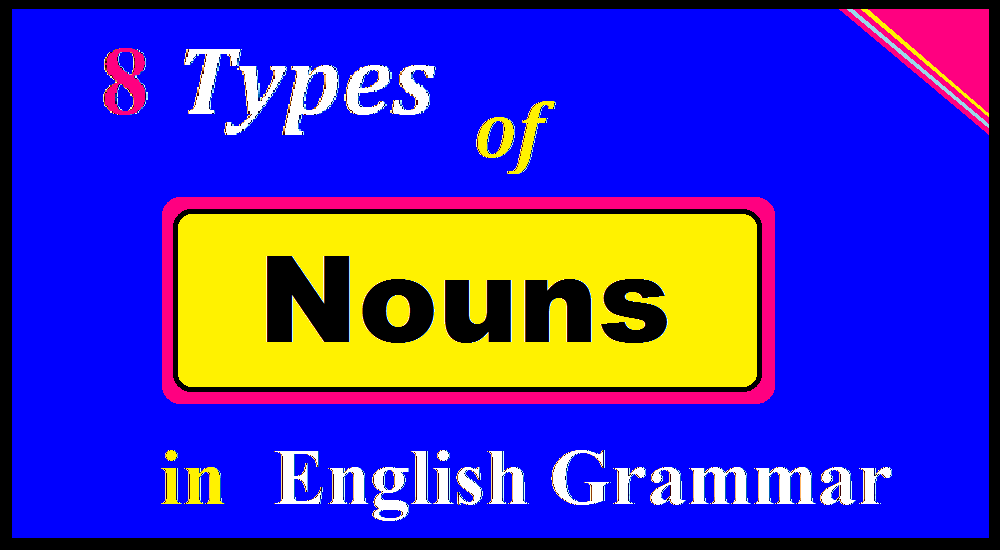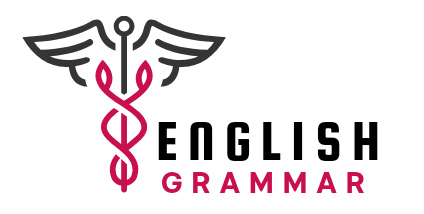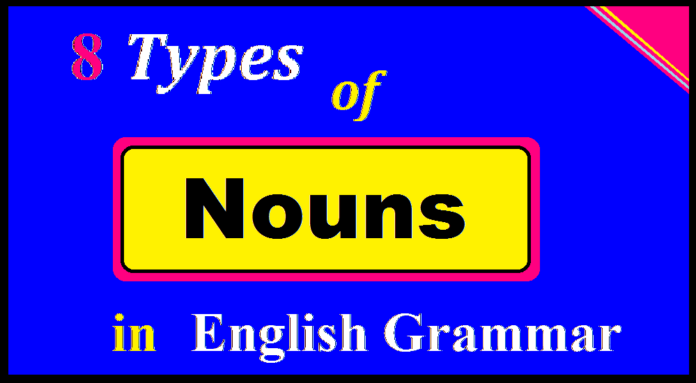The 8 Types of Nouns in English Grammar With Examples. Common, proper, collective, material, abstract, countable, uncountable, singular, plural nouns definition.

In this article, you will find the noun definition, types, and examples. By the end, you will feel confident using them to communicate everyday things clearly and effectively.
Definition of A Noun:
A noun is a naming word used as the name of a person, place, thing, or animal. As, (Ali, school, book) etc.
What is a Noun?
When we talk about parts of speech in English grammar, one of the first things we learn is about “nouns.” Names of people, things, animals, or places are called nouns. They generally act as the subject of the sentence and the foundation of the action.
For Example:
- Naming People: (Kamran, Ali, Imran, Sana, Amjid, Sidra) etc.
- Naming Places: (Pakistan, Lahore, Mosque, School, London) etc.
- Naming Things: (Umbrella, ball, fan, bag, book, pen) etc.
- Naming Animals: (Horse, dog, cat, hen, cow, rat) etc.
In Sentences:
He goes to school.
Allama Iqbal is our national poet.
He is a good boy.
In these sentences (school, Allama Iqbal, boy) are nouns.
The Types Of Nouns In English Grammar With Examples

There are eight types of nouns in English grammar:
1. Common Nouns
A common noun is a word that is given in common to every person, place, or thing of the same class or kind instead of specific names. (Common names like City, Book, Doctor, Boy) etc.
These nouns are not capitalized unless they start a sentence. They form the backbone of sentences and help in organizing thoughts, ideas, and information.
Examples of Common Nouns:
There are some common noun examples given.
- People: (teacher, doctor, child, friend) etc.
- Places: (park, hospital, school, country) etc.
- Things: (car, pen, phone, table) etc.
- Animals: (cat, bird, fish, elephant) etc.
In each example, the common noun names a general person, place, or thing, helping to form a complete thought. They help us express ourselves clearly and connect with others by providing a simple way to name and describe the world around us.
2. Proper Nouns
The names of particular persons, places, or things are called proper nouns. They always start with a capital letter, no matter their placement in a sentence.
(Specific names like Pakistan, Allama Iqbal, The Holy Quran, Lahore) etc.
Instead of saying, (I visited a park, you can specify, “I visited a Central Park”). This clarity transforms general information into something more meaningful.
Examples of Proper Nouns:
Making conversations and writing more precise, here are some proper noun examples:
- Particular Persons: (Allama Iqbal, Quaid-e-Azam, Hazrat Ali (R.A.) etc.
- Particular Places: (Mount Everest, Nile River, New York) etc.
- Particular Things: (The Holy Quran Book, Red Apple Fruit, Samsung Mobile) etc.
Proper names are like the VIPs of language; they give names to the unique and specific people, places, and things that shape our world.
3. Collective Nouns
A collective noun is the name of a group or collection of similar persons or things considered as one complete whole unit. Although the group consists of more than one member, it is considered singular.
(A whole unit like a team, army, class, police, or nation)
Examples of Collective Nouns:
They simplify refer to groups. Here are some collective noun examples:
For People:
Groups of People like (Army, Police, Nation, Team) etc.
- Team: A group of players working together, like in sports.
- Family: A group of people related to each other.
- Class: A group of students learning together.
- Crowd: A group of people gathered in one place.
For Animals:
- Herd: A group of larger animals, like cows or elephants.
- Flock: A group of birds or sheep.
- Pack: A group of wolves or even dogs.
- Swarm: A group of bees or other insects.
For Things:
- Bunch: A group of items like bananas or keys.
- Pile: A stack of things, like books or clothes.
- Set: A collection of related items, like tools or dishes.
- Bundle: A group of things tied together.
4. Material Nouns
Material nouns are words that denote raw materials or substances from which other things are made. They often represent basic elements found in nature or manufactured resources that we use every day.
Examples of Material Nouns:
They are physical substances that we can touch, see, or feel, such as cotton, steel, and water. Here are some common material noun examples for better understanding;
Natural Materials:
(wood, iron, gold, silver, coal) etc.
- Gold: It is used to make jewellery.
- Silver: It is used for coins and ornaments.
- Wood: It is used for furniture and houses.
- Iron: It is used to make tools and machinery.
Processed materials:
(plastic, glass, paper, steel, cotton) etc.
- Cotton: It is used to make clothes.
- Plastic: It is used to make bottles and containers.
- Glass: It is used for windows and mirrors.
- Steel: It is used for construction and vehicles.
Food Substances:
(milk, honey, wheat, sugar) etc.
- Water: used for drinking and cooking.
Look at the materials used in everyday objects around you.
As such, your phone is made of plastic, glass, and metal. As gold is a material because it refers to a precious metal that is used to make jewellery, coins, etc. Wood is another material that describes the substance used in furniture, construction, and crafts.
5. Abstract Nouns
Abstract nouns refer to concepts, feelings, or qualities that cannot be experienced with the senses. These are intangible and exist in our minds. They allow us to articulate ideas about the human experience, moral values, and personal development.
Examples of Abstract Nouns:
They represent what we feel, think, or imagine, rather than what we can see or touch. Here are given some abstract noun examples;
- Emotions include: (happiness, anger, sadness, love, fear) etc.
- Characteristics: (honesty, courage, patience, kindness, bravery) etc.
- Ideas or concepts: (justice, hope, knowledge, democracy) etc.
- States of Being: (freedom, peace, poverty) etc.
They frequently play a major role by serving as the subject or object in a sentence.
As the subject line suggests:
- “Honesty” is the best policy.
- “Success” needs effort and commitment.
As the object line suggests:
- She found “happiness” in small things.
- They celebrated “freedom” after years of battle.
6. Singular & Plural Nouns
A singular noun represents one, while a plural represents more than one. Plural forms often end in (“s” or “es”), but some have irregular forms.
Examples of Singular & Plural Nouns:
There are some examples of singular nouns and plural nouns examples;
- Adding (“s”):
Most singular nouns can be pluralized by simply adding (s).
Singular: dog, car, house, pen, book
Plural: dogs, cars, houses, pens, books
- Adding (“es”):
Some ending in (“s, ss, sh, ch, x, or z”) change with (“es”) to make them plural.
Singular: bus, brush, box
Plural: buses, brushes, boxes
- Changing (“y” to “ies”):
Some ending in (“y”), change with (“ies”) to make them plural.
Singular: baby, city, story
Plural: babies, cities, stories
- Changing (f to -ves)
Some end in (“f” or “fe”), replace them with (“ves”) to make them plural.
Singular: leaf, knife, wolf
Plural: leaves, knives, wolves
- Irregular Plurals:
In English grammar, some nouns that do not follow standard rules are called irregular plurals.
Singular: man, woman, child, tooth, mouse
Plural: men, women, children, teeth, mice
- Same Form in Singular and Plural
Here is a list of nouns that remain the same in both singular and plural forms;
Sheep: One sheep, many sheep.
Deer: One deer, several deer.
Fish: A fish in the pond, many fish in the sea.
Aircraft: One aircraft, multiple aircraft.
Species: A rare species, several endangered species.
Moose: One moose, a herd of moose.
Series: A TV series, many series of books.
Rice: A grain of rice, a bowl of rice.
7. Countable Nouns
Things or persons that can be counted, called countable nouns. They have both singular and plural forms.
Examples of Countable Nouns:
Here are countable nouns examples;
Singular: cat, chair, star, apple, car, dog
Plural: cats, chairs, stars, apples, cars, dogs
If you can attach a number and it makes sense, it’s probably a countable noun. As (two bicycles, four pens, seven apples, one chair, five cars, ten dogs). They can be directly preceded by numbers or quantifiers.
8. Uncountable Nouns
Names of things that are not counted called uncountable nouns. They usually do not have a plural form. You cannot count, water or milk, joy, honesty, beauty, pain.
Examples of Uncountable Nouns:
These uncountable noun examples refer to things that we cannot count individually.
- Substances: (water, milk, oil, air, salt) etc.
- Abstract concepts: information, love, knowledge, happiness, beauty, honesty
- Groups: (Furniture, Equipment, Luggage, Traffic) etc.
They stand out because they represent things that are felt, or experienced as a whole.
Similarly, words like “hair” can be uncountable when referring to the concept of hair, (Her hair is beautiful), but countable when you are referring to individual strands, (I found three hairs on my shirt).
Conclusion:
With time and practice, by understanding these types of nouns in English grammar, you can write and speak more clearly.

